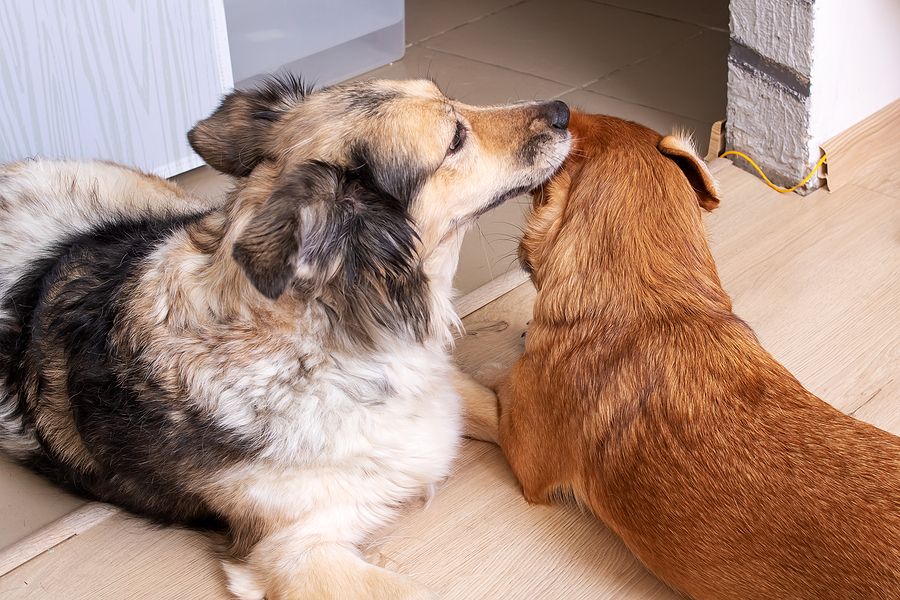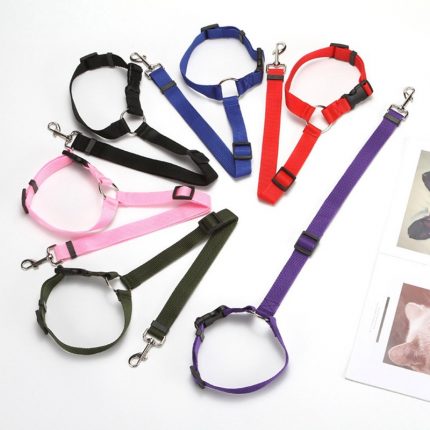Why Do Dogs Bite Each Other’s Ears?
Dogs are fascinating creatures that exhibit a wide range of behaviors, some of which may seem peculiar to us humans. One behavior that often catches our attention is when dogs engage in ear-biting with one another. This behavior can be observed in various contexts, including playtime, social interactions, and even during moments of conflict. But why do dogs bite each other’s ears? In this article, we will explore the possible reasons behind this intriguing behavior.
Firstly, it’s important to understand that dogs primarily communicate through body language. Their ears play a significant role in conveying messages to other dogs. By biting each other’s ears, dogs may be attempting to establish dominance or display their social hierarchy. This behavior can often be observed during play fights, where one dog may gently bite the other’s ears to assert their position within the group.

Additionally, biting ears can also be a form of communication and play between dogs. Puppies, in particular, engage in ear-biting as a means of socializing and developing their bite inhibition skills. Through this interaction, they learn to control the force of their bites and understand the boundaries of acceptable play behavior. It can be seen as a way for dogs to build trust and strengthen their bond with one another.
Furthermore, ear-biting can serve as a release of excess energy and a form of exercise for dogs. Just like humans engage in physical activities to stay fit, dogs also need outlets to channel their energy. Playful ear-biting can be a part of their natural play repertoire, allowing them to engage in a healthy and stimulating activity. It provides mental and physical stimulation, contributing to their overall well-being.
It’s worth noting that not all ear-biting between dogs is harmless or playful. In some cases, ear-biting can be a sign of aggression or a territorial dispute. Dogs may resort to biting each other’s ears when they feel threatened or challenged. It’s crucial for dog owners and caregivers to closely monitor such behavior and intervene if necessary to prevent any harm.
In conclusion, dogs biting each other’s ears can have various underlying reasons. From establishing dominance to playful communication and exercise, this behavior serves multiple purposes in the canine world. Understanding the context and body language of dogs is crucial in interpreting their behavior accurately. By observing and analyzing their interactions, we can gain valuable insights into their social dynamics and enhance our understanding of these magnificent creatures.
The Reasons Behind Dogs Biting Each Other’s Ears
Dogs are social animals that communicate with each other through various behaviors, and one behavior that often captures our attention is when they bite each other’s ears. This intriguing behavior can serve different purposes and can be observed in various contexts. Let’s explore some of the key reasons why dogs engage in ear-biting:
1. Communication and Social Interaction
One of the primary reasons dogs bite each other’s ears is for communication and social interaction. Dogs use a combination of body language, vocalizations, and physical contact to convey messages to one another. Biting ears can be a way for dogs to establish dominance or assert their social hierarchy within a group. This behavior is often seen during play fights, where dogs may gently bite each other’s ears to display their position in the pack.
2. Playfulness and Bonding
Ear-biting can also be a form of play and bonding between dogs. Puppies, in particular, engage in ear-biting as a way to socialize and develop their bite inhibition skills. Through gentle ear-biting, they learn to control the force of their bites and understand the limits of acceptable play behavior. This interaction helps them build trust and strengthen their bond with other dogs.
3. Energy Release and Exercise
Dogs have a natural need for physical activity to release excess energy and stay mentally stimulated. Ear-biting can be a part of their play repertoire, serving as a form of exercise. When dogs engage in playful ear-biting, it allows them to channel their energy in a healthy and stimulating way. This behavior provides mental and physical stimulation, contributing to their overall well-being.
4. Territorial Disputes and Aggression
While most ear-biting between dogs is harmless and playful, it’s essential to recognize that it can also be a sign of aggression or territorial disputes. Dogs may resort to biting each other’s ears when they feel threatened or challenged. It’s crucial for dog owners and caregivers to closely monitor such behavior and intervene if necessary to prevent any harm.

Conclusions
In conclusion, understanding the behavior behind Why Do Dogs Bite Each Other’s Ears is crucial for pet owners who wish to foster a healthy environment for their furry companions. For more insights into this behavior and tips on how to manage it, visit geepets.com, where you’ll find a wealth of information on dog behaviors and how to interpret them.
Additionally, for further reading on canine behavior and how to promote positive interactions between dogs, the American Kennel Club (AKC) offers an extensive library of resources at akc.org. These resources can provide valuable guidance on understanding the complex social behaviors of dogs, including why they might engage in ear biting and how to safely manage this behavior.
Practical Recommendations for Dealing with Dogs Biting Each Other’s Ears
1. Socialization and Training
Proper socialization and training are crucial in preventing problematic ear-biting behavior in dogs. Early socialization with other dogs and exposure to various environments can help them develop appropriate social skills and communication techniques. Enroll your dog in obedience classes or work with a professional trainer to teach them proper behavior and discourage excessive ear-biting.
2. Supervision and Intervention
When dogs engage in ear-biting, it’s important to closely supervise their interactions to ensure their safety. If you notice any signs of aggression or discomfort during ear-biting, intervene immediately to prevent any potential harm. Use positive reinforcement techniques to redirect their attention and encourage more appropriate play behaviors.
3. Provide Adequate Exercise and Mental Stimulation
4. Seek Professional Advice
If you’re facing persistent ear-biting issues or if the behavior escalates into aggression, it’s advisable to seek professional help from a certified animal behaviorist or veterinarian. They can assess the underlying causes of the behavior, such as exploring the question, “Why Do Dogs Bite Each Other’s Ears,” and provide tailored guidance and training techniques to address the issue effectively.
Understanding “Why Do Dogs Bite Each Other’s Ears” can be crucial in identifying the motivation behind this behavior, whether it’s playful interaction gone too far or a sign of dominance or stress. By focusing on the question of “Why Do Dogs Bite Each Other’s Ears,” professionals can offer insights and solutions that specifically target the root of the problem, ensuring a more peaceful coexistence and reducing the risk of ear-biting turning into a more serious form of aggression.
5. Avoid Reinforcing Negative Behavior
Be mindful of inadvertently reinforcing negative ear-biting behavior, often stemming from the question, “Why do dogs bite each other’s ears?” Avoid rough play or encouraging aggressive behaviors that involve biting ears, which can be a common answer to “Why do dogs bite each other’s ears?” Instead, reward and reinforce positive behaviors such as gentle play and appropriate social interactions, steering clear of the behaviors that lead one to ask, “Why do dogs bite each other’s ears?”

Consistency in training and positive reinforcement will help shape desired behaviors over time, reducing the frequency of actions that might cause someone to wonder, “Why do dogs bite each other’s ears?” By understanding the root causes behind the question, “Why do dogs bite each other’s ears?” and addressing these behaviors through positive reinforcement, you can guide your dog towards more desirable interactions, minimizing the need to ask, “Why do dogs bite each other’s ears?”
6. Provide Safe Play Opportunities
Ensure that your dog has access to safe play opportunities with other well-socialized and compatible dogs. Organized playdates or supervised visits to dog parks can provide controlled environments for social interaction and play, which is essential when pondering over “Why Do Dogs Bite Each Other’s Ears.” Observing their interactions closely is crucial, especially in understanding the dynamics behind “Why Do Dogs Bite Each Other’s Ears.”
Our featured products:
If any ear-biting becomes excessive or aggressive, it’s vital to step in. This behavior, often sparked by curiosity about “Why Do Dogs Bite Each Other’s Ears,” can sometimes be playful but may escalate if not monitored. Understanding “Why Do Dogs Bite Each Other’s Ears” can help you recognize the difference between normal play and when it’s time to intervene. In contexts where “Why Do Dogs Bite Each Other’s Ears” becomes a focal point of interaction, it underscores the importance of ensuring these play sessions remain friendly and do not veer into aggression.
7. Consult with a Veterinarian
If you notice excessive ear-biting or if your dog seems to be in discomfort, it’s essential to consult with a veterinarian. Ear biting can sometimes be a sign of underlying health issues, such as ear infections or allergies. A thorough examination by a veterinarian can rule out any medical causes and ensure your dog’s well-being.
Remember, each dog is unique, and the reasons behind ear-biting behavior can vary. Patience, consistency, and positive reinforcement are key in addressing this behavior. By implementing these practical recommendations, you can help your dog develop appropriate social skills and create a safe and harmonious environment for all.















